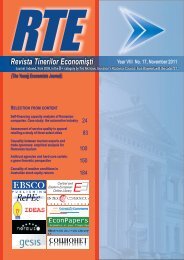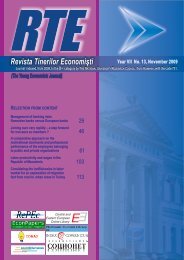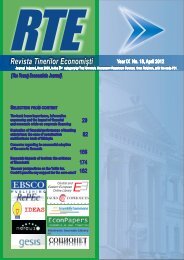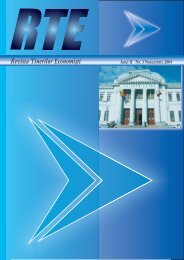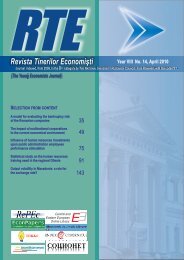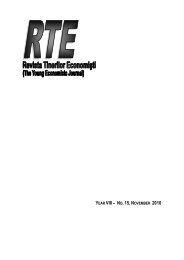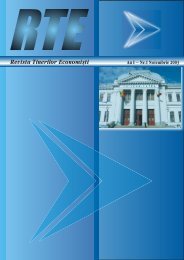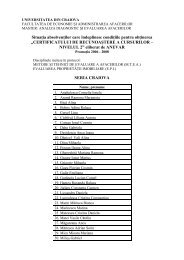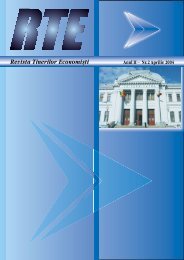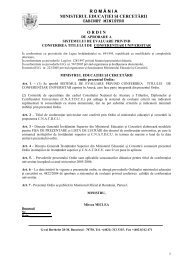Revista Tinerilor Economiºti (The Young Economists Journal)
Revista Tinerilor Economiºti (The Young Economists Journal)
Revista Tinerilor Economiºti (The Young Economists Journal)
Create successful ePaper yourself
Turn your PDF publications into a flip-book with our unique Google optimized e-Paper software.
<strong>Revista</strong> <strong>Tinerilor</strong> Economişti (<strong>The</strong> <strong>Young</strong> <strong>Economists</strong> <strong>Journal</strong>)<br />
On the philosophical-political part we can mention the directions impressed<br />
to public policies by classical contractualist theories: from Hobbes, Locke (classical<br />
ideological liberalism) to the modern supporters of institutionalism based on the<br />
theories of the constitutional law (Kelsen). On the other part, public policies should<br />
observe the rights both negative and positive of the individuals: the right to live, the<br />
right to own a property, the right to freedom or the right of free speaking, the right of<br />
free enterprise, and freedom of association, etc.<br />
3.3. Public politics – towards the ethics of resources grant<br />
<strong>The</strong> resources grant within public politics is rather a problem of the modern<br />
politics and might be generally stated as the difficulty of the preferences aggregation.<br />
This theory proved by K. Arrow shows that it is impossible in a democratic society for<br />
the deciders to observe the conditions of the decision rational-comprehensive theory.<br />
Arrow shows that the choices that certain members of a democratic society –<br />
considered as rational – make, cannot be aggregated so that a collective decision should<br />
be taken, the one that should be the best for all. This limit might be operationalised and<br />
analysed as Arrow’s theory of impossibility starting from a strictly theoretical situation.<br />
We suppose that three persons, A, B, C belong to a commission that should<br />
decide over a public policy. But the persons A, B, C have different points of view<br />
related to the best applicable policy. If there is a hierarchy of solutions as follows: A: a<br />
> b > c, B: b > c > a, C: c > a > b, we can first notice that the individual preferences of<br />
the group members are all transitive. If an aggregation of the three preferences is tried<br />
in order to obtain a social preference (of the deciders group) by comparing the<br />
alternatives two by two then, if one is preferred to the other one by two members of the<br />
commission, that would be the chosen alternative. If it is supposed that within the<br />
commission the choices are made according to the majority, we have the following<br />
relationships: a > b (as both A and C prefer a instead of b). <strong>The</strong> group’s preference will<br />
be the following: a > b > c > a. the social preference is not transitive, because although<br />
a > b and b > c, it does not appear, as it is expected according to the transitivity<br />
characteristic a > c, but c > a. <strong>The</strong> relationship of social preference is periodical. “<strong>The</strong><br />
social preference does not allow a choice to be made in a simple or simplistic way”. 43<br />
4. Conclusions<br />
Choosing a good public policy can lead to ethical or moral dilemmas when it<br />
is conditioned by multiple, competing or desirable (incommensurable) values as<br />
freedom, equality, justice, equity, efficiency. <strong>The</strong> limits of preferences aggregation do<br />
not show that we are not able to make rational assessments, adequate ranking but they<br />
are difficult to attain.<br />
<strong>The</strong>re is no algorithm (meaning a finite, objective, universally valid<br />
technique) to compare according to more criteria, needs, interests, priorities, products,<br />
decisions or policies. It is up to the politician’s assessment, more or less subjective<br />
related to the priorities, to the main public interest, to the most pressing needs. <strong>The</strong><br />
ethical vein should not disappear even if sometimes the decider must chose between an<br />
additional point of justice and freedom, between equity and justice, between truth and<br />
justice, etc. <strong>The</strong> lack of ethics or its elusion in the area of public policies can be a<br />
43<br />
Adrian Miroiu, Introducere în analiza politicilor publice, Bucureşti, 2001,<br />
http://www.spidd.ro/carti/analiza%20politicilorpublice.pdf, accessed at 27.10.2010.<br />
114



